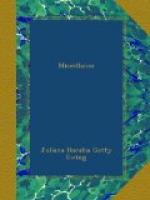“‘I saw no one but you.’
“Which, as it is the nearest approach to a pretty speech that ever was made to me, I confide solemnly to this my fine new diary, which is to be my dearest friend and confidante this year. Why the music went so fast, and the dance was so short on this particular occasion, I never could fathom; both had just ceased, and we were still chatting, when midnight struck, deep-toned or shrill, from all the clocks in the house; and, in the involuntary impressive pause, we could hear through the open window the muffled echo from the village church. Then Mr. Topham ran in with a huge loving-cup, and, drinking all our good healths, it was passed through the company.
“When the servant brought it to me, Mr. Manners took it from him, and held it for me himself by both handles, saying—
“‘It is too heavy for your hands;’ and I drank, he quoting in jest from Hamlet—
“‘Nymph, in thine orisons be all my sins remembered.’
“Then he said, ‘I shall wish in silence,’ and paused a full minute before putting it to his lips. When the servant had taken it away, he heaved so profound a sigh that (we then being very friendly) I said—
“‘What is the matter?’
“‘Do you believe in presentiments, Miss Lascelles?’ he said.
“‘I don’t think I ever had a presentiment,’ I answered.
“‘Don’t think me a fool,’ he said, ’but I have had the most intense dread of the coming of this year. I have a presentiment (for which there is no reason) that it will bring me a huge, overwhelming misfortune: and yet I have just wished for a blessing of which I am vastly unworthy, but which, if it does come, will probably come this year, and which would make it the brightest one that I have ever seen. Be a prophet, Miss Lascelles, and tell me—which will it be?—the joy or the sorrow?’
“He gazed so intently that I had some difficulty in answering with composure—
“‘Perhaps both. We are taught to believe that life is chequered.’
“‘See,’ he went on. ’This is the beginning of the year. We are standing here safe and happy. Miss Lascelles, where shall we be when the year ends?’
“The question seemed to me faithless in a Christian, and puerile in a brave man: I did not say so; but my face may have expressed it, for he changed the subject suddenly, and could not be induced to return to it. I danced twice with him afterwards; and when we parted I said, emphatically—
“‘A happy new year to you, Mr. Manners.’
“He forced a smile as he answered, ‘Amen!’
“Mrs. Dallas (who kindly chaperoned us) slept all the way home; and Miss Dallas and Harriet chatted about their partners. Once only they appealed to me. What first drew my attention was Mr. Manners’ name.
“‘Poor Mr. Manners!’ Harriet said; ’I am afraid I was very rude to him. He had to console himself with you, eh, Dolly?—on the principle of love me love my dog, I suppose?’




